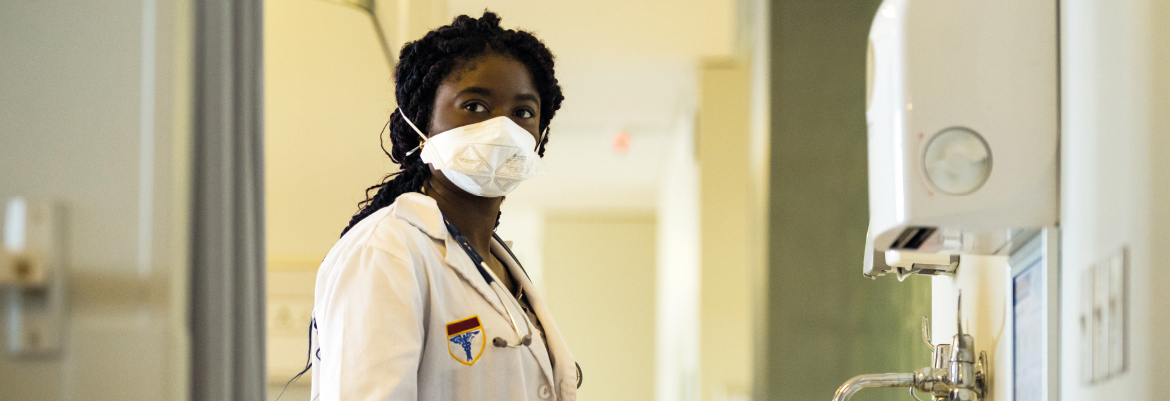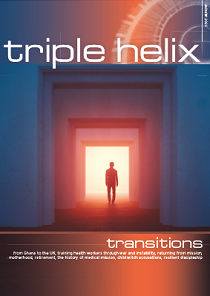Practising medicine in Ghana
I returned to Ghana after a couple of years of being a full-time mum to do my house jobs, rotating in paediatrics and general surgery.The healthcare sector in Ghana at the time ran as a 'cash and carry' system, meaning patients had to pay for everything upfront. There was also a general lack of resources, which meant that even if you had all the money in the world, you could not always get the appropriate investigations or treatments. Clinical decisions were influenced by the patient's ability to afford both investigations and treatments and their availability. A patient with limited finances presenting with signs and symptoms of pneumonia would have to opt for blind treatment with the most affordable antibiotics instead of getting a blood test and a chest X-ray.
Doctors were held in high esteem in a paternalistic culture. Doctors gave patients very basic information about their care, and the patients did not question their decisions. There was not much accountability for the care delivered because of a high patient-doctor ratio (which did not allow time for communication), the lack of resources, and the lack of a professional governance framework. Consequently, one could easily become complacent, unprofessional, and perhaps even unethical.
Whilst this healthcare climate was challenging, it provided a platform to integrate my Christian values with my working practice. I found my Christian walk provided a moral compass ensuring professionalism, good communication, and the delivery of good care despite the circumstances.
Practising medicine in the UK: the hurdle of passing exams
I returned to the UK in 2000 after my house jobs and completed my family. In 2004 I embarked on my next major transition - preparing for a medical career in the NHS. At this point, I had three children under five and had been working as a health care assistant (HCA) to help meet the bills. I was encouraged by a friend to sit for the PLAB (Professional and Linguistic Assessments Board) exam, but I did not think I would be successful. I was working as an HCA, looking after my kids, and had been out of medicine for four years. With the high failure rate, even amongst people who had no such commitments, I felt I had no chance of passing the exam.PLAB was like Goliath to me. I understood how the children of Israel must have felt when they faced the Philistines. This challenge, however, would allow me to experience the truth of Proverbs 27:9 'Oil and perfume make the heart glad, and the sweetness of a friend comes from his earnest counsel' (ESV). The encouragement, support, and counsel of good friends would see me pass the PLAB on my first try. This challenge also had me seeking after God. This helped to bolster my faith. I believed that God's hand was on my medical career and that he would see me get back on track.
Practising medicine in the UK: the hurdle of getting a clinical attachment
The next hurdle on this journey was securing a clinical attachment. These were mostly private arrangements between international medical graduates (IMGs) and a consultant willing to take them on. This was another big challenge for me with my commitments.God, in his faithfulness, brought my way a local GP and a doctor I met via the Royal College of Physicians. With their support, a few weeks later I received an offer of a clinical attachment via a scheme run by Kings College Hospital (KCH) and Queen Elizabeth Hospital (QEH), Woolwich.
Practising medicine in the UK: the hurdle of getting registration
Becoming certified as a doctor in the UK requires registration with the General Medical Council (GMC). You could only do this when you had a job, irrespective of your PLAB or nationality status. Unfortunately, most Trusts would only employ people who are already registered with the GMC, creating a chicken and egg situation. Without registration, you could not get a job, but without a job offer, you could not get registered. Hospitals would only consider you if there was no other candidate with GMC registration. Most IMGs had to churn out hundreds of applications.The only thing I could do was pray and trust God. By his grace, I bumped into a consultant towards the end of my clinical attachment at QEH, who offered me a week's locum on the Trust bank, enabling me to get my GMC registration.
Practising medicine in the UK: the real deal!
Transitioning to being a locum SHO was quite daunting. Isaiah 41:10 ('Fear not, for I am with you; be not dismayed, for I am your God; I will strengthen you, I will help you, I will uphold you with my righteous right hand' - ESV) was a key source of encouragement during this time. My first day as a locum SHO in early 2005 was covering wards on a weekend on-call. I had not been given any induction, so I had to navigate the day by asking for help and guidance from the nursing staff and other doctors, which was difficult as fewer staff were on at the weekend. I felt like a fish out of water. By the end of the day, I had barely touched any of the jobs, and handing over in the evening was an awful experienceDespite trying to take comfort from Isaiah 41:10, I left the shift feeling helpless and hopeless, as I thought I had done a really poor job. Discouraged by this, I went back to working as an HCA. I felt I wasn't cut out to be a doctor in the UK. I could identify with Simon Peter's comment, 'I'm going fishing' [1]
To my amazement, the locum agency called a few weeks later to say that the hospital had contacted them and asked specifically for me. If I had found favour with my colleagues, it was because of God.
This time around, it was a weekday shift. I met with the team and had an induction and a clear job description. The following weeks and months would mark my transition into the NHS system.
One of the key challenges was getting used to the fact that every diagnostic test and treatment was readily available and did not require discussions with families about affordability.
Treatments, such as renal replacement therapy, were quite new to me, as well as the whole concept of clinical governance, audits, and formal training using an e-portfolio.
The culture was completely different. Junior doctors, especially IMGs, were not respected. Some of the patients talked down to us, demanded regular updates on their treatment, and expected a high level of care and accountability despite their rudeness. Some patients refused treatment for seemingly trivial reasons, such as asking for discharge against medical advice while awaiting an angiogram to avoid missing a football match.
Despite the entitled attitude of some patients, doctors were expected to always be professional, and most were. This clash of attitudes was a massive culture shock!
Most IMGs were from minority ethnic groups and faced a lot of discrimination. This may have been because we trained abroad, but it could also be due to racism. Irrespective, there was a clear distinction between IMGs and UK graduates, who were highly confident, knew their rights, and could sometimes be extremely arrogant. I remember being berated by a fellow SHO because I had prescribed salbutamol wrongly. They clearly thought of locum IMGs as 'rubbish doctors' and treated us as such. It was humiliating and demoralising.
But my Christian faith instilled in me a godly nature, enabling me to maintain a high level of professionalism and good communication at all times. This made it easier for me to integrate. As Christians, our conduct allows us to flourish in every circumstance. Developing a Christ-like nature supersedes human weakness.
Settling into the NHS system required the humility to learn from everyone, including the nursing staff, mental fortitude to endure the hostility (mainly from patients), and the resilience to soldier on in a sometimes-hostile environment. With the support of the various mentors I had acquired on the journey, the encouragement of family and friends, and the help of Almighty God, I completed my training. I got a consultant job exactly where my journey began - the QEH in Woolwich.
Mercy Domi-Kwame is a Consultant in Acute Medicine at Queen Elizabeth Hospital, Woolwich and a Medical Examiner and Postgraduate Supervisor































